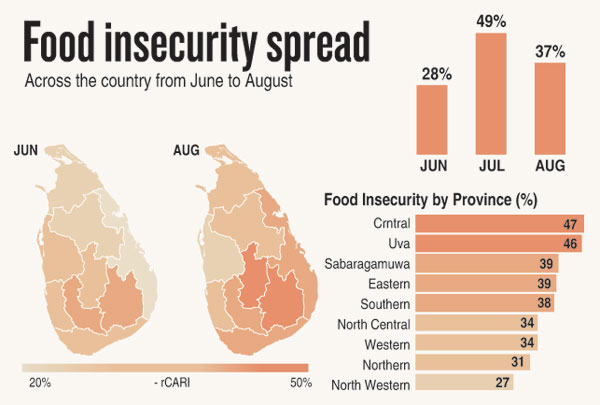News
ADB spells out emergency assistance for Lanka’s poor
View(s):By Kapila Bandara
Livelihood support for Sri Lankans who are most vulnerable, and assistance to secure essential items including food and fertiliser are a part of the Asian Development Bank’s emergency assistance, the 68-member bank told the Sunday Times.
Rising levels of food insecurity (see graphic from World Food Programme) and malnutrition, in particular among children below five years old, are causing alarm, despite an organised attempt at deceit by some politically-tainted doctors and discredited politicians to deny the humanitarian emergency. About eight in 10 Sri Lankan households are not having meals, or are cutting down the number of meals they eat, surveys by UN agencies show. 
This week, the ADB announced at its 55th annual meeting at its home base, that the bank will provide US$ 14 billion until 2025 to Asia and the Pacific to help ease a worsening food crisis and to improve long-term food security by strengthening food systems against the adverse impacts of climate change and the loss of biodiversity.
To help address food insecurity in Sri Lanka, the ADB is working with the Government to implement an emergency assistance loan of US$ 200 million (Rs 72.8 billion) signed in early September, to improve access to food and protect livelihoods of the poor and vulnerable, especially women and children; supporting fertiliser imports and agricultural production by repurposing an existing agriculture sector loan, and helping with imports of essentials, including food and fertiliser, through ADB’s trade and supply chain finance programme and assistance to the private sector.
Every three Sri Lankans in 10 do not have food security and are eating less, while women and children now have higher rates of malnutrition.
The ADB plans more support after the approval of the IMF programme, the bank said. The exact amount of assistance will depend on further discussions between the Government and the bank.
In 2021, the the ADB disbursed US$ 684m (Rs 249.097b) to Sri Lanka and committed US$ 460m in project lending, reports show. The bank provided a US$ 150m loan to buy coronavirus disease vaccines, to strengthen the health information system, and build capacity for disease surveillance.
Maga Engineering (US$ 254.11m, or Rs 92.5b), China National Technical import and Export Corp., (US$ 37.81m, or Rs 13.7b), and Nawaloka Construction Co (Pvt) (US$34.13m, or Rs 12.42b), are among those who have won ADB contracts.
Under the US$ 200m ADB loan, funds will support the temporary increase in the monthly cash grant and beneficiaries of existing social assistance programmes for at least three months, the bank said.
In addition, this will replace the monthly food vouchers for pregnant and lactating women with cash grants of a higher value. It will also support undernourished children below two years of age.
The information technology systems and digital tools for the Samurdhi programme, and agriculture and agrarian development will be upgraded to improve ways of choosing the cash grant beneficiaries, verification, monitoring, and communication.
Funds will help improve financial, advisory, and other services for low-income families and farmers.
The ADB said stronger financial management and governance will be adopted. ADB’s policies for procurement and anti-corruption will apply.
Highly-politicised and tainted by corruption, the social help programme, Samurdhi, has failed Sri Lankans who are worse off than those in poverty (the pre-crisis poverty line was Rs 6,966 a month).
By its own admission, the department, under State Minister Shehan Semasinghe, has yet to clear some claims from 2020. R.P.B. Thilakasiri heads the department. Its politicised, and inefficient nature is amply illustrated by 23,000 staff who operate the scheme in Grama Niladhari divisions, or a staffer serving just 78 families, it has been estimated.
In 2021, Central Bank of Sri Lanka annual data show that 1.8 million Sri Lankans were Samurdhi beneficiaries. The selection criteria were laid out in the Welfare Benefits Act Gazette of 2019.
In August, the World Food Programme also supported an Rs 7,500 grant in two instalments for families with less-abled members, children below five years old, and pregnant, or lactating mothers.
The best way to say that you found the home of your dreams is by finding it on Hitad.lk. We have listings for apartments for sale or rent in Sri Lanka, no matter what locale you're looking for! Whether you live in Colombo, Galle, Kandy, Matara, Jaffna and more - we've got them all!

